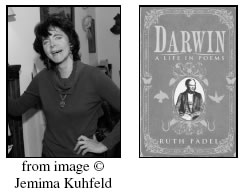Review
Darwin – A Life in Poems, Ruth Padel
Darwin – A Life in Poems, Ruth Padel, 2009, Chatto & Windus. £12.99 ISBN 978-0-7011838-5-1

“Right from the start it’s
human experience ... which
drives the book”
Padel’s sequence of poems about her great-great-grandfather, Charles Darwin, was kick-started by several commissions for the Darwin bicentenary. Aptly sub-titled A Life in Poems, it is a chronological account of Darwin’s life in five chapters covering his early life; the voyage in the Beagle; the first notebooks and species speculations; marriage and family (the death of children and the question of God); his friendship and rivalry with Alfred Russel Wallace and the publication of On the Origin of Species.
It’s a fascinating life: the explorations of a mind at work as well as the physical voyage to the Tropics. Padel is good at place. She evokes the tactile, colourful, sensual world, whether London or the garden of Down House or the Tropics. Darwin’s journey and his collector’s eye provide her with exuberant imagery used to the full in poems such as Lavender Light in a Leap Year, describing his first experience of rainforest, or in Plankton where “The deck is dazzle, fish-stink, gauze-covered buckets.”
Right from the start it’s human experience, however, which drives the book: Darwin’s voice comes through in poems like Haunted recalling his experience as a young medical student, “The amputation table: a drawn-out sobbing / yell. The smells – bowels opening, sawn bone. / ‘Long before the blessed days of chloroform.’ ” The poems in City (1837-1838) chart the development of Darwin’s thinking in the context of his life in London, interacting with an orang-utan at London Zoo or observing Lurcher puppies and thinking of oysters: “ ‘Free will is to mind what chance / is to matter,’ he writes”.
As a life story, the book works, though there are a few oddities of perspective such as Alfred Russel Wallace’s first person account of observing and, shockingly to modern ears, shooting orang-utans in Borneo; and the narrator obtrudes in remarks such as “The microbe hunters haven’t got going / yet. (Louis Pasteur’s thirteen.)”
The big question for me is the relationship between the quotations and the poet’s own imaginative voice. Padel says in her introduction, ‘As for the words: I have had to tinker with some of them as they became poems.’ Tinkering is exactly the problem here. In her concern to keep Darwin’s voice, and selecting from an admittedly huge word horde, she has perhaps been over-reverential. There are quoted observations which don’t hold together as poems and there are poems that are purely quotation. The evocative lines of Remembering Milton in the Night at Sea (though presumably cut down from the original) might have read better without Padel’s erroneous line breaks. The attempt to force it into a poetic form seems a kind of formal dishonesty.
The sequence has margin notes throughout, a device which suits the long, informative narrative of this book: the equivalent of the background chat of a poetry reading. It is something she might have used to free the poetry from the constrictions of historical narrative, allowing her to dispense with those poems which exist merely as links in the narrative chain.
In places I am troubled by Padel’s lack of ear for the line, but in general the interest of this book is character rather than form and cumulative narrative rather than individual poem. Padel says in the introduction that what she most wanted to give was Darwin’s voice. I think she has achieved this. Here is Darwin: from the boy Stealing the Affection of Dogs to the man corresponding with Charles Lyell in a quandary over Wallace’s paper on species selection or suffering with his wife the death of a baby. He continued to publish until the end of his life, his mind “ ‘a machine / for grinding laws / out of large collections of facts’ ”.
‘Idleness is misery.’ The life-forms
tell him their stories, as if he could walk
through the organic world like a door
and touch the source of light. (The Extra Eye)
Here is the mesh of his thought and experience. Darwin’s life whole, as promised: a life in poems.
Page(s) 13-14
magazine list
- Features

- zines

- 10th Muse
- 14
- Acumen
- Agenda
- Ambit
- Angel Exhaust
- ARTEMISpoetry

- Atlas
- Blithe Spirit
- Borderlines
- Brando's hat
- Brittle Star

- Candelabrum
- Cannon's Mouth, The
- Chroma
- Coffee House, The
- Dream Catcher
- Equinox
- Erbacce
- Fabric
- Fire
- Floating Bear, The
- French Literary Review, The
- Frogmore Papers, The
- Global Tapestry
- Grosseteste Review
- Homeless Diamonds
- Interpreter's House, The
- Iota
- Journal, The
- Lamport Court
- London Magazine, The
- Magma
- Matchbox
- Matter
- Modern Poetry in Translation
- Monkey Kettle
- Moodswing
- Neon Highway
- New Welsh Review
- North, The
- Oasis
- Obsessed with pipework
- Orbis
- Oxford Poetry
- Painted, spoken

- Paper, The
- Pen Pusher Magazine

- Poetry Cornwall
- Poetry London
- Poetry London (1951)
- Poetry Nation
- Poetry Review, The
- Poetry Salzburg Review
- Poetry Scotland
- Poetry Wales
- Private Tutor
- Purple Patch
- Quarto
- Rain Dog
- Reach Poetry
- Review, The
- Rialto, The
- Second Aeon
- Seventh Quarry, The
- Shearsman
- Smiths Knoll
- Smoke
- South
- Staple
- Strange Faeces
- Tabla Book of New Verse, The
- Thumbscrew
- Tolling Elves
- Ugly Tree, The
- Weyfarers
- Wolf, The

- Yellow Crane, The
